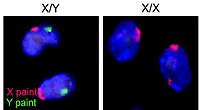
Photo from wikipedia
Polymorphism of alleles that benefit one sex but harm the other (sexually antagonistic alleles) generates selective pressures for reduced recombination between themselves and sex-determination loci. Such polymorphism can be maintained… Click to show full abstract
Polymorphism of alleles that benefit one sex but harm the other (sexually antagonistic alleles) generates selective pressures for reduced recombination between themselves and sex-determination loci. Such polymorphism can be maintained within a population when selection coefficients are sufficiently balanced between males and females. However, if regulatory mutations restrict gene expression only to one sex, these alleles become neutral in the other sex and easily fixed within a population, removing the selective pressures for recombination suppression in sex chromosomes. When there is spatial variation in selection regimes, however, alleles that are deleterious in one sex and neutral in the other can be maintained in other neighboring populations and gene flow may continuously supply deleterious alleles. We hypothesized that this maintenance of genetic variation may promote the establishment of recombination suppression in sex chromosomes even in cases where selection is limited to one sex. Using individual-based simulations, we show that spatial variation in male-limited selection and gene flow can promote the establishment of Y-autosome fusions, a special case of recombination suppression in sex chromosomes. This can be explained by the fact that fused Y-chromosomes that capture alleles that are beneficial for local males have a higher mean fitness compared to unfused Y chromosomes in the presence of deleterious gene flow. We also simulated the case of sex-concordant selection and found that gene flow of alleles that are deleterious in both sexes did not substantially increase the establishment rates of Y-autosome fusions across the parameter space examined. This can be accounted for by the fact that foreign alleles that are deleterious in both sexes can be efficiently removed from the population compared to alleles that are neutral in females. These results indicate that how gene flow affects the establishment rates of Y-autosome fusions depends largely on selection regimes. Spatial variation in sex-specific selection and gene flow should be appreciated as a factor affecting sex chromosome evolution.
Journal Title: Journal of theoretical biology
Year Published: 2017
Link to full text (if available)
Share on Social Media: Sign Up to like & get
recommendations!